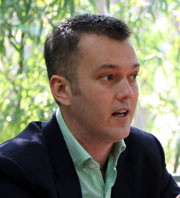On Friday, November 14, 2014, the Center for Global Governance at the Asan Institute for Policy Studies hosted a closed roundtable with Dr. Alistair D.B. Cook, Research Fellow in the Centre for Non-Traditional Security Studies at the S. Rajaratnam School of International Studies, Nanyang Technological University (NTU), Singapore.
In a presentation, titled “Research Trends in Southeast Asian Non-Traditional Security,” Dr. Cook discussed how non-traditional security issues have shaped conventional strategic outlooks and spurred cooperation in Southeast Asia. Highlighting the role of the Association of Southeast Asian Nations (ASEAN), Dr. Cook explored the implications of non-traditional security cooperation in Northeast Asia.
Date/Time: Friday, November 14, 2014 / 2:00pm–4:00pm
Venue: Conference Room (3F), The Asan Institute for Policy Studies
Speaker
 Alistair D.B. Cook is a Research Fellow at the Centre for Non-Traditional Security(NTS) Studies, S. Rajaratnam School of International Studies, Nanyang Technological University (NTU), Singapore. In 2012-2013, he was a visiting research fellow at the East Asian Institute of the National University of Singapore. His research interests are in non-traditional security and human security in the Asia-Pacific including peace and conflict studies, environmental security and climate change, foreign policy and regional cooperation, and domestic politics in Myanmar. He has recently co-edited Irregular Migration and Human Security in East Asia (Routledge, 2014), Non-Traditional Security in Asia: Issues, Challenges and Framework for Action (ISEAS, 2013) and has published in a variety of journals. He is also a resident analyst on Myanmar and regional security issues for Channel NewsAsia. This year he was elected treasurer of the International Studies Association – Asia-Pacific section (2014-2016). He graduated with a PhD from the University of Melbourne, Australia; Masters from Purdue University, USA; and M.A. (Hons) from St.Andrews University, Scotland. He has taught at Purdue University, University of Melbourne, Deakin University, Nanyang Technological University and Australian National University.
Alistair D.B. Cook is a Research Fellow at the Centre for Non-Traditional Security(NTS) Studies, S. Rajaratnam School of International Studies, Nanyang Technological University (NTU), Singapore. In 2012-2013, he was a visiting research fellow at the East Asian Institute of the National University of Singapore. His research interests are in non-traditional security and human security in the Asia-Pacific including peace and conflict studies, environmental security and climate change, foreign policy and regional cooperation, and domestic politics in Myanmar. He has recently co-edited Irregular Migration and Human Security in East Asia (Routledge, 2014), Non-Traditional Security in Asia: Issues, Challenges and Framework for Action (ISEAS, 2013) and has published in a variety of journals. He is also a resident analyst on Myanmar and regional security issues for Channel NewsAsia. This year he was elected treasurer of the International Studies Association – Asia-Pacific section (2014-2016). He graduated with a PhD from the University of Melbourne, Australia; Masters from Purdue University, USA; and M.A. (Hons) from St.Andrews University, Scotland. He has taught at Purdue University, University of Melbourne, Deakin University, Nanyang Technological University and Australian National University.

 Facebook
Facebook Twitter
Twitter





